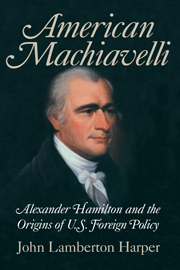Book contents
- Frontmatter
- Contents
- List of Illustrations
- Acknowledgments
- Miscellaneous Frontmatter
- Introduction
- PART I THE COMING OF NECESSITY
- PART II BATTLE LINES ARE DRAWN
- PART III SEIZING THE HELM
- PART IV INFORMAL ADVISER TO THE PRINCE
- PART V A PRINCE IN HIS OWN RIGHT?
- PART VI THE LESSER OF EVILS
- Conclusion: Hamilton Then and Now
- Notes
- Bibliography
- Index
Introduction
Published online by Cambridge University Press: 05 April 2013
- Frontmatter
- Contents
- List of Illustrations
- Acknowledgments
- Miscellaneous Frontmatter
- Introduction
- PART I THE COMING OF NECESSITY
- PART II BATTLE LINES ARE DRAWN
- PART III SEIZING THE HELM
- PART IV INFORMAL ADVISER TO THE PRINCE
- PART V A PRINCE IN HIS OWN RIGHT?
- PART VI THE LESSER OF EVILS
- Conclusion: Hamilton Then and Now
- Notes
- Bibliography
- Index
Summary
The twentieth century belonged to Thomas Jefferson. One of Washington, D.C.’s most prominent monuments is consecrated to the Sage of Monticello. As for his historic rival, Alexander Hamilton, there is no Palladian temple, only a run-of-the mill statue on the south side of the Treasury Department. If the point were to commemorate their respective contributions to the building of the country, Hamilton, arguably, would have the monument and Jefferson a mere statue. He was as responsible as anyone for the establishment of the American union: the consolidation and funding of the national debt, the tax system, the customs service, and the first Bank of the United States. Jefferson, his ally James Madison, and their followers did all they could to sabotage Hamilton’s program of developing these sinews of national strength.
The key to Jefferson’s popularity perhaps lies less in what he accomplished than in what he so eloquently spoke for: liberty and equality. There has also been a great deal of deliberate promotion. It was Franklin Roosevelt, after all, who put Jefferson’s face on the five-cent piece and built the memorial. FDR wrapped himself in Jefferson’s mantle, and helped to make him the patron saint of the New Deal and modern liberalism. Even as they adopted Hamiltonian methods with gusto during the Great Depression and after World War II, Democrats cast the elitist and “economic royalist” Hamilton as the villain of the piece. The tenders of the Jefferson flame included a group of prominent historians, Claude Bowers, Dumas Malone, Julian Boyd, Merrill Peterson, and Adrienne Koch, whose semihagiographical treatment of Jefferson and sometimes-lurid portrayal of Hamilton was for many years the mainstream view.
- Type
- Chapter
- Information
- American MachiavelliAlexander Hamilton and the Origins of U.S. Foreign Policy, pp. 1 - 8Publisher: Cambridge University PressPrint publication year: 2004



